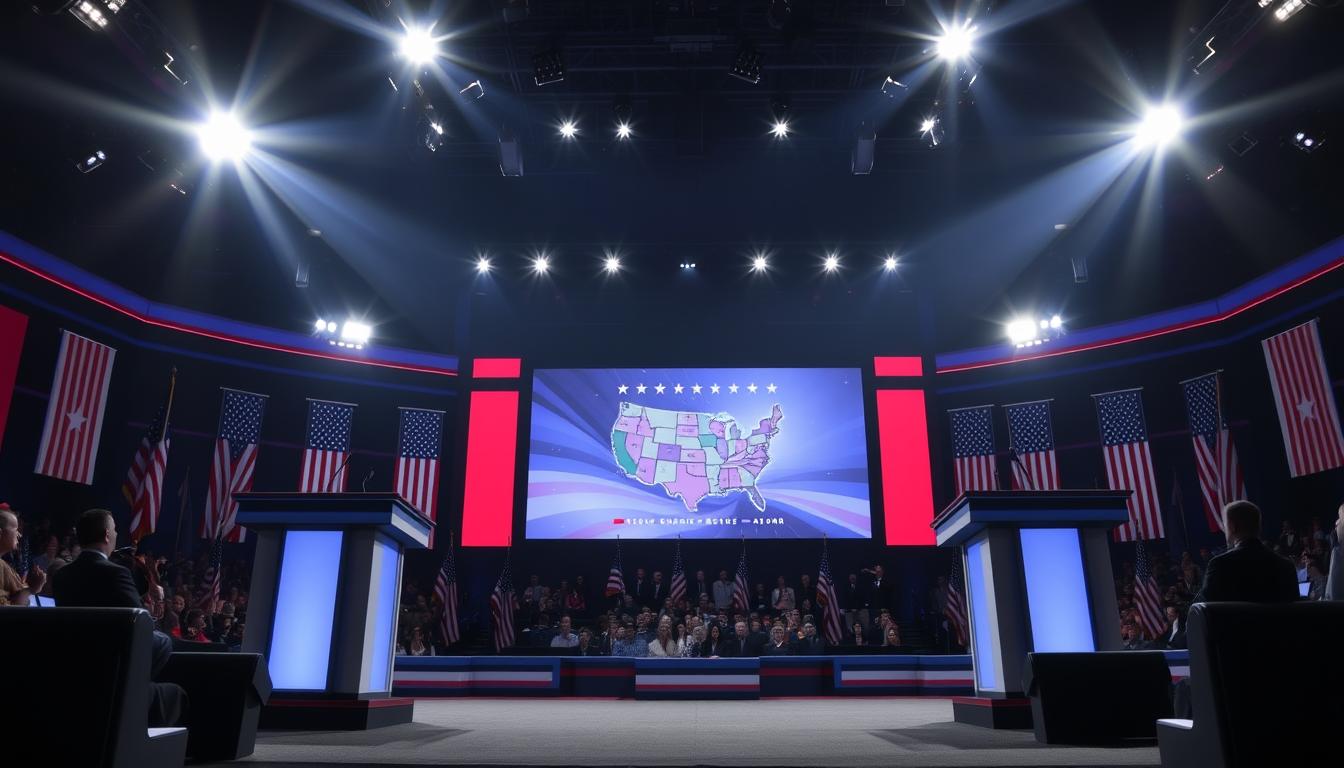Exploring The U.S. Political Debates
The U.S. political debates play a key role in American politics. They are where candidates share their visions and policies with the public. These debates are more than just meetings; they shape public opinion and inform voters.
They also greatly influence who wins elections. Over time, debates have become crucial for candidates to share their views and engage with opponents. This article looks into the world of political debates, covering their evolution, the roles of candidates, and the current trends in American politics.
The Evolution of U.S. Political Debates
The journey of political debate in the United States shows a big change in how leaders share their ideas. This change has made debates a key part of U.S. politics today. From casual talks to today’s structured debates, this shift has changed how people see politics and how politicians argue.
Historical Overview of Political Discourse
Political talks in the U.S. started when the country was founded. The Lincoln-Douglas debates in 1858 were a big start to formal debates. These debates showed how candidates argued and countered, showing early examples of political debate that still matter today.
Shifts in Debate Formats and Topics
Debates changed as politics did. The Kennedy-Nixon debate in 1960 was a big change, showing how TV debates changed politics. Debates moved from small meetings to TV shows, changing what topics were discussed and how they were presented.
Impact of Technology on Political Debates
Technology has changed debates a lot. Social media and online tools have changed how candidates reach out to people. Now, debates include real-time fact-checking, letting viewers check facts as they watch. This makes debates more interactive and changes how people see candidates.
The Role of Presidential Candidates in Debates
In U.S. election debates, presidential candidates play a key role. They shape the narrative and sway public opinion. Recent debates show how charisma, responsiveness, and issue mastery can impact voters.
Key Candidates in Recent Elections
Recent elections have seen many candidates stand out. Each has shown unique qualities that shape their performance. Figures like Joe Biden and Donald Trump have caught attention for their debate tactics and policies.
Candidate Performance: What Matters?
When judging candidate performance, several factors are crucial. Charisma, understanding of issues, and emotional intelligence matter a lot. Voters like candidates who are authentic, confident, and can connect personally.
Strategies Used by Candidates During Debates
Candidates use various strategies to succeed in debates. These include:
- Directly questioning opponents to highlight contrasts
- Using memorable slogans to reinforce key messages
- Addressing public concerns and current issues effectively
- Leveraging body language and tone for stronger engagement
These strategies can sway opinions and grab media attention. The way candidates communicate verbally and non-verbally shapes the narrative around them.
| Candidate | Performance Highlights | Campaign Strategies |
|---|---|---|
| Joe Biden | Empathetic engagement, focus on unity | Responding with calmness, direct addressing of concerns |
| Donald Trump | High energy, memorable quotes | Challenging opponents, polarizing topics |
| Kamala Harris | Witty retorts, policy-focused | Emphasizing systemic change, direct attacks on misinformation |
U.S. Political Debates: Issues and Topics
The current political scene is filled with hot topics that spark intense debates. These issues show what today’s voters care about and shape our country’s policies. Topics like healthcare, immigration, taxes, and climate change are key. Candidates share their views on these to win over voters during debates.
Hot Button Issues in Current Political Discourse
Some issues keep popping up in politics. Here are the main ones right now:
- Healthcare reform and access
- Immigration policy and border security
- Taxation and economic policies
- Climate change and environmental policies
Policy Debates: Bridging or Widening Polarization?
Political divisions are big today. Debates on tough issues often lead to different opinions. Candidates might try to find common ground or use strong words to stand out. Debates are key because they can bring people together or make them more divided.
Debate Analysis and Public Opinion
Debates are key moments in political campaigns. They shape public opinion and change how voters see candidates. Analyzing debates helps us understand the strategies behind the scenes.
Key moments in debates can change everything. They are crucial for those who plan campaigns.
How Debates Shape Voter Perceptions
Candidates meet face-to-face in debates. This lets voters see their style, policies, and how they handle questions. These moments can change how people see candidates.
A standout moment or a big mistake can make headlines. This affects how voters see a candidate’s views. Debates help us understand what voters think and feel.
Public Opinion Polls and Debate Impact
After debates, polls often show big changes in public opinion. Analysts watch these changes to see how debates affect voters. By comparing polls before and after a debate, we can see if candidates did well.
This data helps us see how campaigns change. It shows how stories in politics evolve.
Current Trends in Election Debates
Political debates have changed a lot. They now show how candidates want to be seen and talk to voters. The way debates are set up is key to how messages are shared and received.
Live Debates vs. Pre-Recorded Segments
Debates can be live or pre-recorded. Each type has its own benefits. Live debates feel more real-time, letting candidates react quickly. Pre-recorded debates let candidates perfect their words and avoid mistakes.
- Live Debates: Feel more genuine, connecting with viewers better.
- Pre-Recorded Segments: Let candidates polish their messages and avoid errors.
Political Rhetoric and Its Effects on Elections
The words used in debates matter a lot. Good rhetoric can win hearts or lose votes. Candidates who speak in a way that feels real and emotional often do better.
Engagement Metrics: Viewership and Online Interaction
How people react to debates tells us a lot. Viewership shows who’s watching, and online comments show who’s talking. Here’s a look at how debates perform:
| Debate Format | Average Viewership (millions) | Social Media Engagement (posts) |
|---|---|---|
| Live Debates | 15 | 200,000 |
| Pre-Recorded Segments | 10 | 150,000 |
These numbers show live debates are more popular. They get more viewers and online buzz, showing they grab people’s attention.
Conclusion
Political debates in America are more than just places for candidates to speak. They show the heart of the American political system. They also highlight the complex nature of today’s public talks.
These debates are key places where issues are broken down, strategies are shared, and candidates’ true selves are shown. Millions of voters watch, making big decisions at the polls. The effect of debates on election results is huge, shaping what voters think and do.
As American politics changes, so must debate formats. We need to reach more people and make debates real and meaningful. This will help debates connect with the public and give clear views on candidates and their plans.
In short, debates are crucial in American democracy. They’re not just campaign events but key parts of informed public talks. By improving how debates are done, we can make them more open and useful. This will help the democratic process for elections to come.
FAQ
What is the significance of U.S. political debates in elections?
U.S. political debates are key in shaping public opinion. They help voters understand important election issues. Candidates use debates to show their policies and engage with opponents, affecting election results.
How have political debates evolved over time?
Debates have changed from casual talks to formal, televised events. Moments like the Lincoln-Douglas debates and Kennedy-Nixon debates set the stage. Now, technology adds real-time interactions and fact-checking.
What factors influence candidate performance in debates?
Several things affect how well candidates do in debates. Charisma, knowing the issues, body language, and quick responses matter. Using catchy slogans and addressing public worries can also sway voters’ opinions.
What are some current hot-button issues in political debates?
Today’s debates focus on healthcare, immigration, taxes, and climate change. These topics show what candidates stand for. They often highlight the divide between different political views.
How do debates impact voter perceptions and public opinion?
Debates can change how voters see candidates. They can even sway election results. Polls track these changes, showing debates’ power in shaping public opinion.
What are the differences between live debates and pre-recorded segments?
Live debates offer spontaneous moments and direct audience interaction. Pre-recorded segments provide a more polished look. Each style affects how candidates are seen by voters.

